A biographer reports, “A violent thunderstorm struck Vienna in the afternoon of 26 March 1827. At 5:45 pm, a sudden flash of lightning was reported, and the dying man suddenly raised his head, stretched out his own right arm majestically—like a general giving orders to an army. This was but for an instant; the arm sunk back; he fell back; Beethoven was dead.”
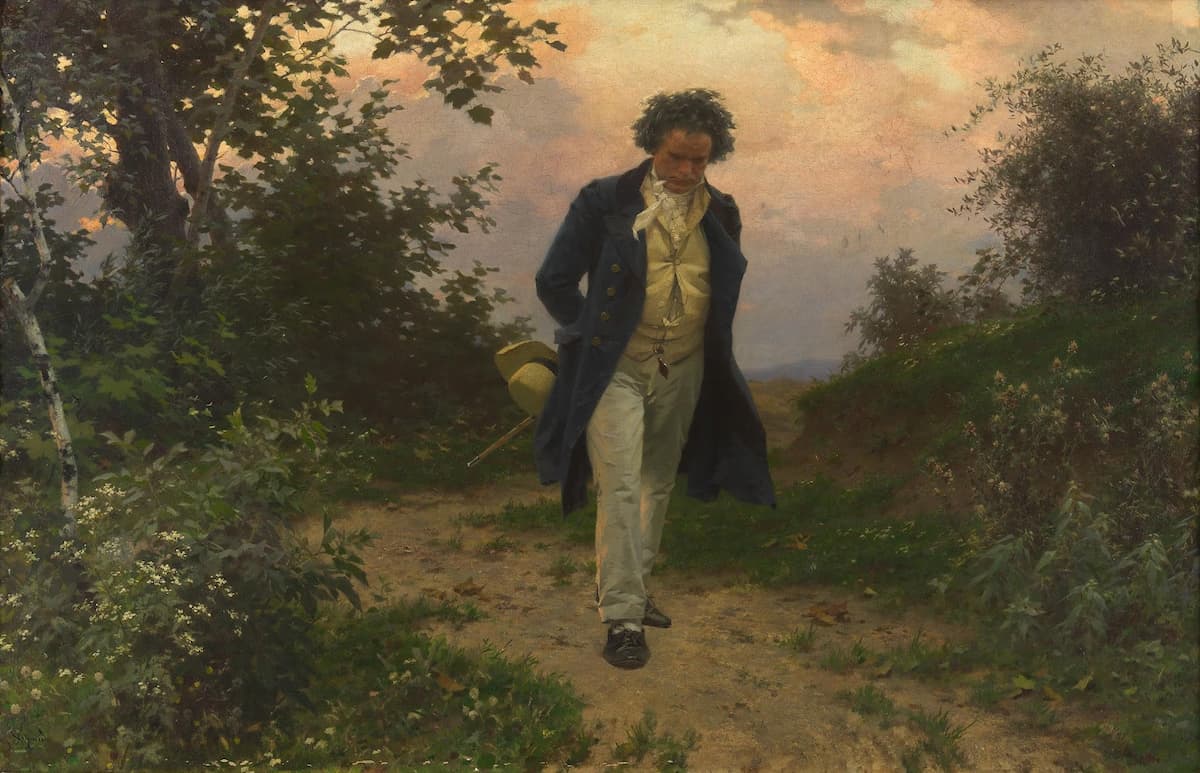
Julius Schmid: Beethoven’s Walk in Nature
What a dramatic description, indeed. The raging elements and flashes of light illuminate a hero who is trying to defy fate and death. The transformation from man to icon and to a legendary symbol of genius began when Beethoven was still alive. The reverence for Beethoven, even before his death, went far beyond his musical creations and his human qualities. He was described as a courageous hero, an outsider, “and standing at the very portals of the infinite realm of the spirit.” Beethoven was the suffering artist who freed music, and who gave hope to oppressed people from all over the globe. Already in his day, Beethoven himself became inseparable from his critical and popular reception. As a scholar writes, “no other Western composer has been amplified to the same degree by posterity; and none has come to embody musical art the way Beethoven has. More than a composer, he remains today one of the pre-eminent cultural heroes of the modern West.”
Ludwig van Beethoven: Symphony No. 5 in C minor, Op. 67 “Allegro con brio”
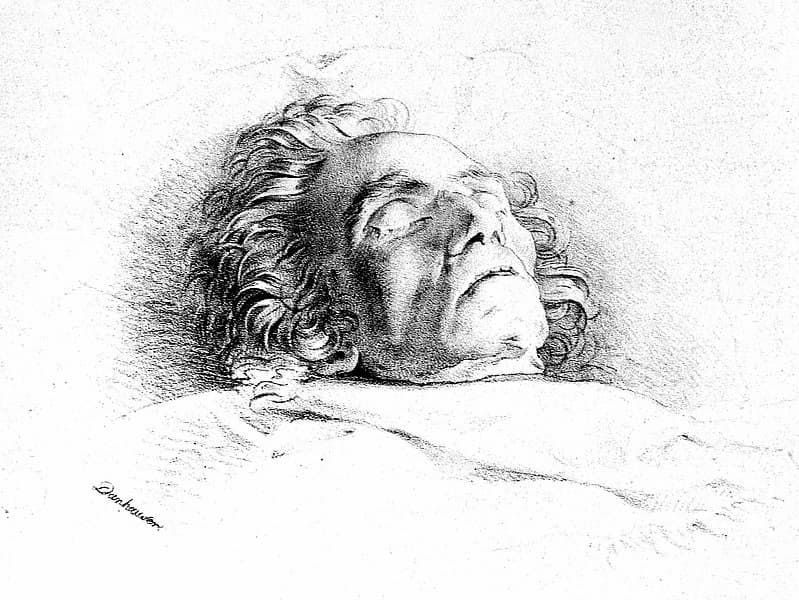
Beethoven on his deathbed
For over two centuries we have probed the man and his music from every conceivable angle and discovered, amongst others, a mythological hero, a paradigm for personal and political freedom, or more recently, a “murderous raging rapist incapable of attaining release.” Be that as it may, the music of Beethoven enjoyed immediate appeal among a growing class of bourgeois music lovers, and paired with compelling biographical circumstances, “the mythically viewed image of Beethoven the creative artist took hold quickly and tenaciously, finding little or no resistance until the 20th century. To this day, the Beethoven myth remains an indelible part of the popular imagination.” The biographical circumstances that gripped the public after Beethoven’s death were the discovery of the 1802 “Heiligenstadt Testament,” and the famous letter to the “Immortal Beloved.” On one hand, we find a socially isolated composer whose only immediate solution was the contemplation of suicide, but one who eventually decides on a living martyrdom for the sake of his art. However, the letter to the “Immortal Beloved,” turned Beethoven into a true Romantic. As a creative artist, he was cut off from the simple communal joy of society, who yearned for an idealized love, “and he was able to react to these privations with an outpouring of music conceived on an unprecedented scale.”
Ludwig van Beethoven: String Quartet in C Major, Op. 59, No. 4 “Menuetto & Allegro”
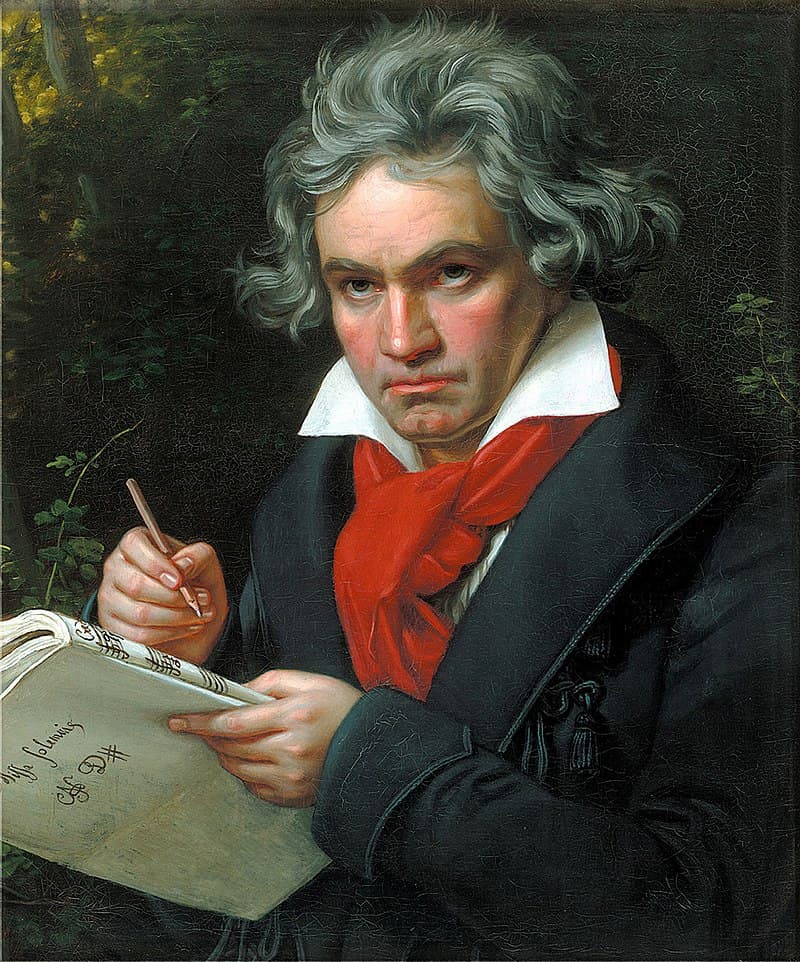
Joseph Karl Stieler: Beethoven, 1820
According to scholars, Beethoven’s ascension into a mythological hero partially relied on the theological concept of the trinity. For many observers, he was the crowning pinnacle of a musical line stretching from Haydn to Mozart. As his patron, the Count Waldstein wrote, “Beethoven went to Vienna to receive Mozart’s spirit from Haydn’s hands.” Feeding into the trinity narrative was the idea of separating Beethoven’s music into three distinct style periods. While it was hotly debated whether the first two periods were preparatory, it was the music of the “late period” receiving the biggest transformation in its reception. Many early critics, according to Scott Burnham, “held these works to be the symptoms of illness; the prevailing later view prefers to understand them as the highest testimony to his genius.”
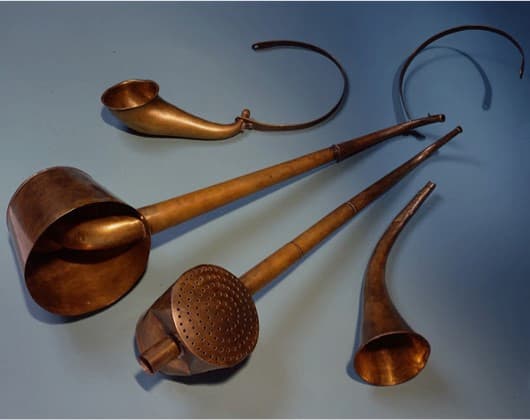
Beethoven’s ear trumpets
It was actually Richard Wagner in his 1870 monograph glorifying Beethoven’s deafness “as a trait of enhanced interiority, with the deaf composer forced to listen inwardly.” Concurrently, Beethoven was being looked at from empirical angles, foremost among them the study of his sketches. Scholars basically discovered the composer’s workshop, which confirmed the “compositional act as both a human undertaking and a titanic struggle.”
Ludwig van Beethoven: Piano Sonata No. 32 in C minor, Op. 111
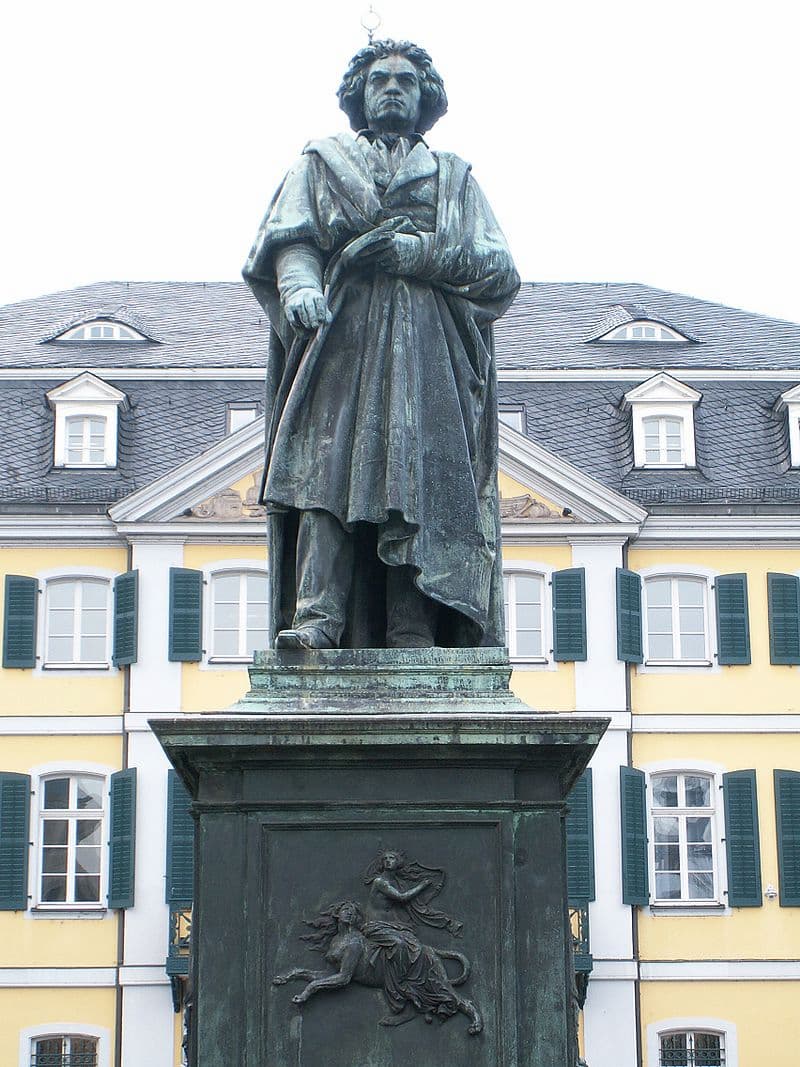
Beethoven’s monument in Bonn
During the mid 20th century, commentators were gradually transforming the mythical figure of Beethoven back into flesh and blood. Deconstruction became the battle cry of countless studies that found Beethoven a severely disturbed man and a humanly flawed artist. Cultural studies started looking at the Beethoven myth as a cultural construction, and much focus is based on “the nature of its formation and persistence.” Traditional historical scholarship continued, and Beethoven certainly remains alive and well in mainstream commercial culture. As Burnham writes, “a good deal of its vitality stems from the kitsch industry: the standard image of Beethoven’s face and mane—the ‘Lion King’ of Western music—is reproduced ubiquitously, while the opening motive of the Fifth Symphony is still Western art music’s most recognizable roar. And let’s not forget that an almost 200-year-old stream of minor novels, novellas and films about Beethoven continues unabated.” In 2023, it is impossible to imagine a time “when Beethoven’s music will not continue to exercise its paradoxically confounding, confrontational, and foundational force.”
For more of the best in classical music, sign up to our E-Newsletter
Ludwig van Beethoven: Missa Solemnis in D Major, Op. 123 “Kyrie”

BEETHOVEN ar trebui sa aibe statui in toate orasele lumi…mai ales i EUROPA—U E ar trebui sa finanteze-STATUI in masa pentru toate localitatile din UE…..
Forced to listen inwardly truly drove this Genious to finding that element, that element within us all which connects us to the uppermost. Call it soul or other, his internal connection with the uppermost was rewarded with the greatest musical creation of the 19th century. To call him a genius is an understatement, If call him Touched by the Hand of God.
Beethoven gave me the most enjoyment in my life. I have listened to his music since I was a teen to the present day, almost 80 years old. My biggest collections of CDs contain his music. I have attended concerts in most major cities in USA that were dedicated to his music. I always looked to see a movie about his life played by Richard Burton. He was ideal for that role. In aggregate, his music has given pleasure to the majority of people around the globe. Heck, my door bel has five tunes. One, mine, is the first note of his fifth symphony.